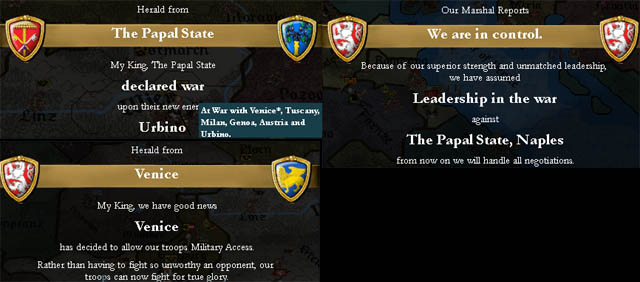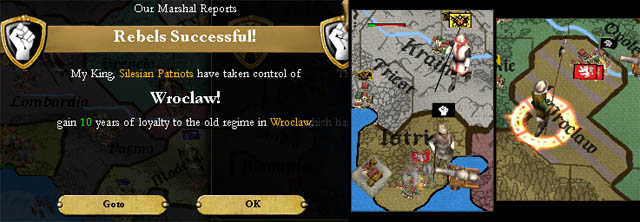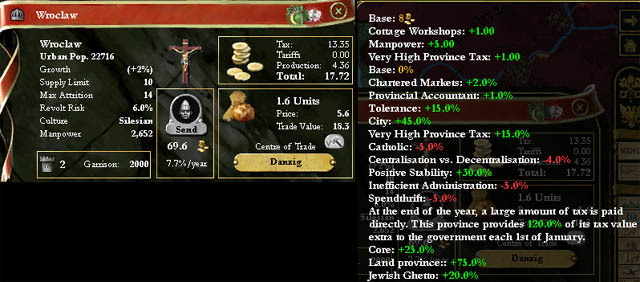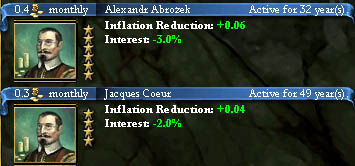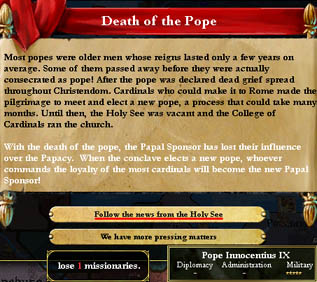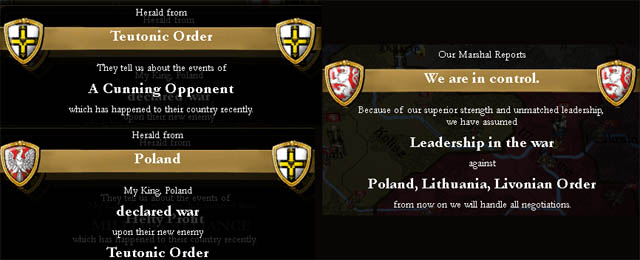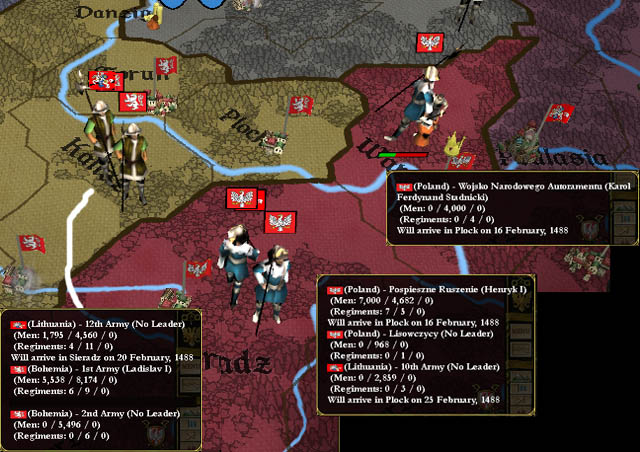5. News from the Mediterranean
Another update with 'what's going on in the world'-focus
Ottoman Exploits
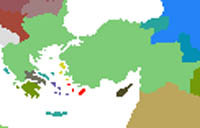
Turkish empire in 1468
It is in November 1468 that the Ottoman Sultan Numan I., eager to expand his domain further into rich Syria and acting upon news of significant provincial uprisings in Egypt against the long-weakened rule of the Mamluk Burji dynasty, declares war on this rival, also perceived to be diplomatically isolated.
Little does he know that, while indeed few of the Muslim principalities dare to side with the declining Mamluk Sultanate, a secret agreement of the latter with a powerful Christian adversary is about to lead to the opening of an unexpected second front.

It says the Mamluks declared war, but I think it is event-driven again.
For this reason the worst fate can be averted for the Burji, and even after the unavoidable Ottoman triumph in the Levant, Numan, maybe in fear of another crusade, settles for very modest demands. Austria has to give away most of their recently acquired Serbian holdings, but keeping even part of it should be counted as a success, given the circumstances; at least, this is the tenor heared by the Mamluk ambassadors, curiously leading the negotiations of the alliance.

Expecting this alliance to last seems unreasonable now.
More Ottoman military vigor is invested into pursuing the sultan's claims on the lands formerly belonging to the deceased Roman Empire. In 1471, the crusader state of Athens as well as further parts of Serbia are absorbed, and Numan doesn't stop at this point.

Naxos was able to hold onto its independence.
Disregarding the formally still lasting truce, this time capitalizing on a conflict between the Mamluks and some of the Arabian states, the Ottomans shocks both parties alike by declaring war again in May 1475. The clever Egyptian diplomats manage to convince the Austrian emperor once more that this means an immediate threat to his specific and Christian interests in the Mediterranean in general.

Austrian military campaigns are launched through Croatia and Serbia, utilizing armies from across the Holy Roman Empire, gathered on the emperor's calling. These are initially successful, also due to the largest Ottoman armies battling elsewhere, and go on for over two and a half years.
A sudden end is however reached with the death of Ladislas Postumus during the assault on a castle somewhere in Albania. The heiress to the Austrian duchy, Maria Theresia, decides to drop the costy war effort, rather unpopular within the empire, to avoid a further loss of favour for her dynasty. This way, at least a bare majority within the college of electors can be convinced to support her husband for emperor.

The archbishop of Cologne's vote can be interpreted as an abstention
This time, the Mamluk territorial losses are more substantial.

Backing off in this particular war does not mean the end of Austria's aggressive Balkan policy under Maria Theresia. In fact, the more humble goal of attaining suzerainty over Bosnia is pursued again as early as January 1478.

I accept and take the stability hit, seeing it as a trade for some Austrian trust.
And so, only half a year later..


Turkish empire in 1478
Venetian miscalculation
Being world-renowned first-class merchants with a long and rich history to look back on, especially well-versed in the arts of diplomacy, espionage, economics, mathematics, it seems a bit odd that Venetians are actually not good at all when it comes to risk management in the military field, especially concerning subtle aspects such as who and when to attack, if war is considered an attractive prospect, who that country might count among his friends and who else might take offence at the approach.

"We cannot foresee everything" - Merchants of the Venetian council explaining the situation to the burghers in April 1472
You might notice that Bohemia is the defensive alliance leader. This is a nice result of my earlier warning, although realistically the Austrian emperor should probably be the leader. Since a Venetian DoW during the first years of the game (often rather suicidal) is almost bound to happen, I had some regiments placed preemptively in Slovenia beforehand.

Left: View of the preemptive placement.. I know it is a bit gamey, but should I rather pretend to be surprised? Right: Milan is still a Venetian vassal
Another difficult topic for Venetian military leaders is the question where to focus and spend their resources. So, while the Venetians concentrate on places like these ..

.. admittedly, with some success ..

.. The terraferma soon (August 1473) looks like you can see below, with the city Venice itself under Austrian siege. Given the circumstances, the demands of the 'defending party' are quite reasonable.

Gameplay-wise, the acquisition of these two Italian provinces (Istria and Friuli, if the screenshot is unreadable) is a step for Bohemia towards losing the 'Limited Port Infrastructure' modifier. My hope is that Austria will keep helping me with any rebel problems for a while, so the amount of extra attention the provinces will need should be limited. Apart from that, it is also nice to have a foothold in Italy, although it is mostly symbolic at this stage. Istria is not in the HRE or the 'original HRE' region and Friuli, while flagged as 'original HRE', is rather poor and not the capital of a former HRE state, so its conquest doesn't result in any penalties for me. Taking for example rich Treviso might have been a different matter and also Treviso (like Verona) somehow doesn't count as having a port and is of no use in getting rid of the 'Limited Port Infrastructure'.

Taking provinces from Venice is not 'safe' with regards to the HRE in MMP2

We now have access to the Barbary Pirates mechanic. Also, extensive anti-piracy measures are installed (of course in Danzig they are already in place).
Another update with 'what's going on in the world'-focus
Ottoman Exploits

Turkish empire in 1468
It is in November 1468 that the Ottoman Sultan Numan I., eager to expand his domain further into rich Syria and acting upon news of significant provincial uprisings in Egypt against the long-weakened rule of the Mamluk Burji dynasty, declares war on this rival, also perceived to be diplomatically isolated.
Little does he know that, while indeed few of the Muslim principalities dare to side with the declining Mamluk Sultanate, a secret agreement of the latter with a powerful Christian adversary is about to lead to the opening of an unexpected second front.

It says the Mamluks declared war, but I think it is event-driven again.
For this reason the worst fate can be averted for the Burji, and even after the unavoidable Ottoman triumph in the Levant, Numan, maybe in fear of another crusade, settles for very modest demands. Austria has to give away most of their recently acquired Serbian holdings, but keeping even part of it should be counted as a success, given the circumstances; at least, this is the tenor heared by the Mamluk ambassadors, curiously leading the negotiations of the alliance.

Expecting this alliance to last seems unreasonable now.
More Ottoman military vigor is invested into pursuing the sultan's claims on the lands formerly belonging to the deceased Roman Empire. In 1471, the crusader state of Athens as well as further parts of Serbia are absorbed, and Numan doesn't stop at this point.

Naxos was able to hold onto its independence.
Disregarding the formally still lasting truce, this time capitalizing on a conflict between the Mamluks and some of the Arabian states, the Ottomans shocks both parties alike by declaring war again in May 1475. The clever Egyptian diplomats manage to convince the Austrian emperor once more that this means an immediate threat to his specific and Christian interests in the Mediterranean in general.

Austrian military campaigns are launched through Croatia and Serbia, utilizing armies from across the Holy Roman Empire, gathered on the emperor's calling. These are initially successful, also due to the largest Ottoman armies battling elsewhere, and go on for over two and a half years.
A sudden end is however reached with the death of Ladislas Postumus during the assault on a castle somewhere in Albania. The heiress to the Austrian duchy, Maria Theresia, decides to drop the costy war effort, rather unpopular within the empire, to avoid a further loss of favour for her dynasty. This way, at least a bare majority within the college of electors can be convinced to support her husband for emperor.

The archbishop of Cologne's vote can be interpreted as an abstention
This time, the Mamluk territorial losses are more substantial.

Backing off in this particular war does not mean the end of Austria's aggressive Balkan policy under Maria Theresia. In fact, the more humble goal of attaining suzerainty over Bosnia is pursued again as early as January 1478.

I accept and take the stability hit, seeing it as a trade for some Austrian trust.
And so, only half a year later..


Turkish empire in 1478
Venetian miscalculation
Being world-renowned first-class merchants with a long and rich history to look back on, especially well-versed in the arts of diplomacy, espionage, economics, mathematics, it seems a bit odd that Venetians are actually not good at all when it comes to risk management in the military field, especially concerning subtle aspects such as who and when to attack, if war is considered an attractive prospect, who that country might count among his friends and who else might take offence at the approach.

"We cannot foresee everything" - Merchants of the Venetian council explaining the situation to the burghers in April 1472
You might notice that Bohemia is the defensive alliance leader. This is a nice result of my earlier warning, although realistically the Austrian emperor should probably be the leader. Since a Venetian DoW during the first years of the game (often rather suicidal) is almost bound to happen, I had some regiments placed preemptively in Slovenia beforehand.

Left: View of the preemptive placement.. I know it is a bit gamey, but should I rather pretend to be surprised? Right: Milan is still a Venetian vassal
Another difficult topic for Venetian military leaders is the question where to focus and spend their resources. So, while the Venetians concentrate on places like these ..

.. admittedly, with some success ..

.. The terraferma soon (August 1473) looks like you can see below, with the city Venice itself under Austrian siege. Given the circumstances, the demands of the 'defending party' are quite reasonable.

Gameplay-wise, the acquisition of these two Italian provinces (Istria and Friuli, if the screenshot is unreadable) is a step for Bohemia towards losing the 'Limited Port Infrastructure' modifier. My hope is that Austria will keep helping me with any rebel problems for a while, so the amount of extra attention the provinces will need should be limited. Apart from that, it is also nice to have a foothold in Italy, although it is mostly symbolic at this stage. Istria is not in the HRE or the 'original HRE' region and Friuli, while flagged as 'original HRE', is rather poor and not the capital of a former HRE state, so its conquest doesn't result in any penalties for me. Taking for example rich Treviso might have been a different matter and also Treviso (like Verona) somehow doesn't count as having a port and is of no use in getting rid of the 'Limited Port Infrastructure'.

Taking provinces from Venice is not 'safe' with regards to the HRE in MMP2

We now have access to the Barbary Pirates mechanic. Also, extensive anti-piracy measures are installed (of course in Danzig they are already in place).
Last edited:







































